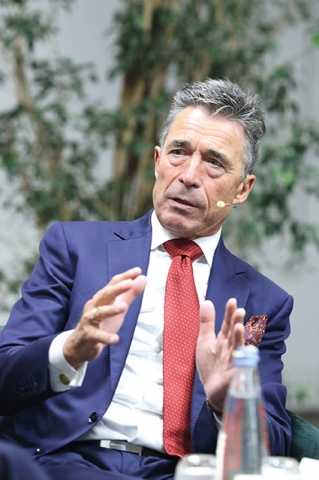Things to Know about Rasmussen’s “Indecent Proposal”
Op-Ed
As displeased as Irma Inashvili (of the Patriot Alliance party) and her cohort of like-minded “West’s bad, Russia’s good” followers were, or perhaps because of it, the proposal that the former NATO Secretary General voiced at the Tbilisi International Conference this week, was an offer that Georgia simply has no luxury to refuse, to put it in Godfather lingo. That is, unless we want Russia to continue biting off the Georgian territory piece by piece, hardly bothered by stern words of condemnation that the many Western powers have found themselves limited to when it comes to reacting to Georgian issue. Just let a couple of things sink in:
• The man tables the (arguably only) realistic scenario for Georgia to become a NATO member and the vice-speaker of Georgian Parliament tries to sabotage the conference where it’s being discussed.
• Let’s assume tomorrow NATO tells us we can go in and Article 5 can cover the whole of Georgia, including Abkhazia and South Ossetia. Never mind NATO defenses- are we ourselves ready for such a scenario militarily? Hardly.
And now for the “German model” that Rasmussen, and earlier, Heritage Foundation’s Luke Coffey referred to: West Germany became a member of NATO on May 6, 1955. As you well know, Germany was a divided country back then, with its eastern part occupied by the Soviet Union, creating a Democratic (the nerve!) Republic of Germany, which had no real will or sovereignty to decide its own course.
From 1955-1990, until the unification of Germany, Article 5 of the NATO Charter, that of collective security, did not cover the territory of the Democratic Republic of Germany (GDR, or East Germany, to put it simply, where the Soviet Military forces were still lounging about). Now some might point to the fact that West Germany should have recognize the sovereignty of its eastern half, but let’s delve deeper into the subject before we pass judgment, shall we?
From 1955, one of the tenets of West Germany’s foreign policy was the so-called Halstein Doctrine, dictating that the Federal Republic of Germany would not establish diplomatic relations with countries that recognized the GDR as a sovereign state.
The Halstein Doctrine, in essence, can be compared to the non-recognition policy that our country has pursued since 2008. But there is yet another plot twist. 17 years after becoming a NATO member, on December 21, 1972, West and East Germany signed an agreement recognizing each other as sovereign countries.
And as unthinkable as such scenario is in Georgia’s case, one must remember that even that couldn’t deter the German people from uniting in 1990 and creating one country that is modern Germany today.
Theoretically, the Rasmussen Model, as cheesy as it sounds and at the risk of provoking Mr. Coffey’s ire, offers us the following:
Georgia becomes a NATO member and this membership will be modeled after West Germany membership from 1955 to 1972. There are three main conditions to identify here:
1. We do become part of the Alliance
2. Article 5, of Collective Security, does not cover, TEMPORARILY, territories occupied by the Russian Federation
3. We continue the non-recognition policy
It would be quite far-fetched for anyone to say that, like Germany, we would have to recognize our breakaway territories as sovereign states after becoming NATO members. Another thing to underline is that the non-recognition policy, notwithstanding who has been at the helm of the country so far, has proved a success and we don’t have much to worry that the modern democratic world will change its mind towards this issue anytime soon.
That’s what simple realpolitik logic dictates. What we need to do is not be a failed state when such opportunity arrives to slot seamlessly into the Euro-Atlantic security space.
And for sanity’s sake, let’s forego the speculation that NATO wants us to give up and relinquish something. This might be a bitter pill to swallow but NATO membership in the foreseeable future is much more likely than regaining territorial integrity. In fact, the latter would hardly happen if the former were not to take place first.
As for James Appathurai’s recent statement, where he said that there’s no appetite in NATO to consider such a scenario [see page 2], as much a friend of Georgia he is, and even keeping in mind that Appathurai is still an active official at NATO, while Rasmussen is a former Sec Gen, I would not think the latter’s opinion on the matter to be spontaneous or less important. Think Positive.
By David Bragvadze, Georgian Institute of Security Policy (GISP)












